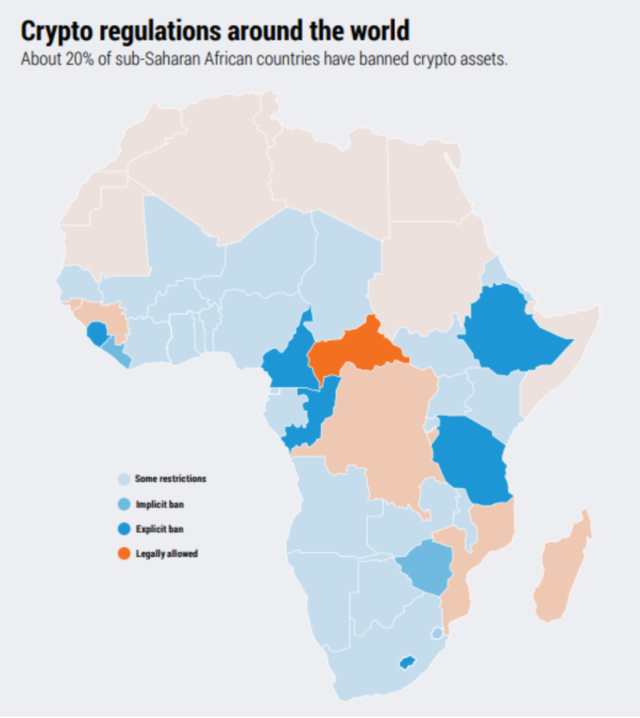In recent times, the heartbeat of Africa has been pumping to the rhythm of cryptocurrency. The decentralized digital currencies, with Bitcoin (BTC) and Ethereum (ETH) leading the charge, have witnessed a significant uptick across the continent. This rise is shaped by various factors, ranging from the need for financial inclusion to capitalizing on new-age technological advancements.
Africa is witnessing a silent revolution. Despite being one of the smallest crypto markets, its pace of growth is nothing short of extraordinary. Data from Chainalysis reveals that the continent’s crypto transactions soared to an impressive $20 billion monthly in mid-2021. Since then, dramatic advances have taken place.
This surge can’t be ignored, especially when major players like Kenya, Nigeria, and South Africa take centre stage. The youth, particularly in Nigeria, view cryptocurrencies as more than just digital assets – they see them as lifelines. With high unemployment rates and a burgeoning youthful population, crypto provides a beacon of hope, a way out of the economic quagmire.
Amid this crypto buzz, it’s impossible to overlook the cultural influences that subtly shape our attraction to shiny new things. Crypto has often been compared to a casino, and there is a truth to that. But an investment is not exactly like taking a spin on the roulette wheel or wildlife-themed slot games. Why? Because there is real utility behind some crypto and blockchain technology. They are volatile, yes, but there are real use cases, which could change the future of Africa.
The correlations are evident across the board, particularly in the virtual realm where crypto has plenty of untapped potential and applications.
Both crypto and virtual entertainment offer a sense of modernity, a touch of the unknown, and the dream of prosperity. However, just as in any game, there are stakes, and the stakes are incredibly high in the crypto world.
Built on Solid Foundations: For Crypto, It’s Blockchain
Blockchain, the bedrock upon which these digital currencies are built, is the real MVP in this story. Its innate properties of decentralization, transparency, and immutability are not just wooing fintech enthusiasts but also carving a niche in sectors like remittances, supply chains, and even regulatory compliance.
A testament to Africa’s readiness to embrace digital solutions is seen in Rwanda’s ambitious goal of going cashless by 2024. The Rwandan government’s initiatives, such as equipping 20,000 taxis in Kigali with free motor meters to enable digital payments and waiving transaction fees for mobile payments, have significantly accelerated the adoption of digital transactions.
However, as with any innovation, there are always concerns. The rapid embrace of crypto and its potential to replace traditional currencies has raised alarms about macroeconomic stability. A report by UNCTAD highlights the inherent risks, especially for developing nations. The risks span from potential financial instability to concerns about illicit financial flows.
It’s clear that while Africa is ripe for crypto and blockchain adoption, a tightrope must be walked between fostering innovation and ensuring stability. UNCTAD’s recommendations for regulation, including mandatory registration of crypto exchanges, regulating decentralized finance, and possibly implementing transaction taxes, can serve as guiding steps.
How to Regulate Cryptocurrency in Africa
Cryptocurrency, with its potential to redefine financial landscapes, has taken the world by storm, and Africa is no exception. The continent’s approach to regulation requires a strategy tailored to its unique challenges and opportunities.
- Educate the Public:Increase awareness about the advantages and risks of cryptocurrencies.
- Engage Industry Stakeholders:Collaborate with crypto professionals to draft informed regulations.
- Foster Innovation Through Sandboxes:Allow businesses to test crypto products in a controlled environment.
- Adapt International Best Practices:Look to countries with progressive crypto regulations as a template.
- Protect Investors Without Stifling Growth:Prioritize security and transparency while promoting innovation.
- Establish Clear Taxation Guidelines:Clarify how crypto earnings and transactions are taxed.
- Collaborative Cross-border Regulations:Shared guidelines can ensure uniformity and prevent businesses from moving solely for regulatory benefits.
Banning crypto is not the answer, as some nations have opted to do. As Cloud Africa’s Parmar aptly puts it, the sheer demand for alternative financial solutions and the benefits offered by crypto and blockchain make bans ineffective. Furthermore, with P2P exchanges accounting for 6% of Africa’s crypto transactions, it’s evident that the public is eager to engage in this new financial frontier.
Yet, the road ahead is not without its bumps. Investment in Africa’s blockchain and crypto sectors face hurdles, from regulatory concerns to securing investor confidence. While the continent boasts a 1,668% YoY growth in blockchain venture funding in Q1 2022, it still only captures a meagre 0.5% of the global funding pie.
In conclusion, Africa’s tango with crypto is complex. While the continent is poised to harness the potential of cryptocurrencies and blockchain, striking a balance between innovation, financial inclusion, and macroeconomic stability will be challenging. The days ahead are filled with promise, but the journey requires strategic navigation, careful regulation, and a commitment to harnessing technology for the greater good.









